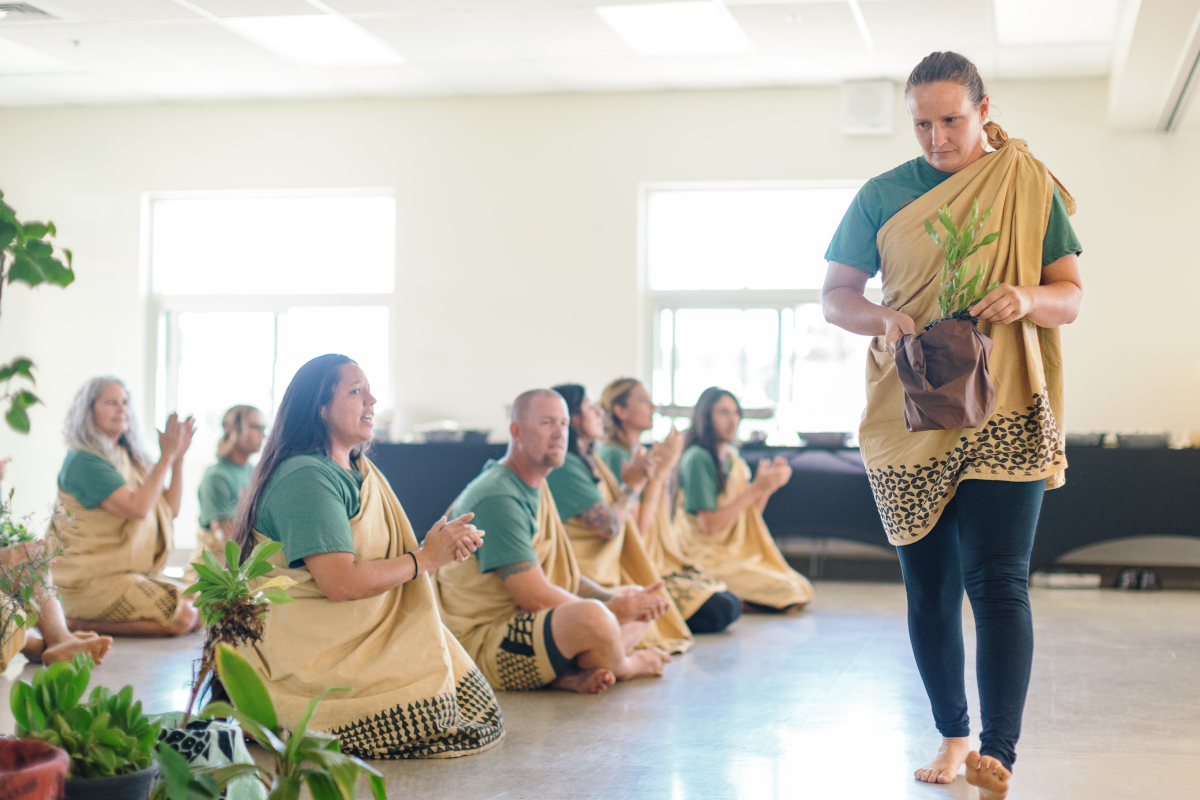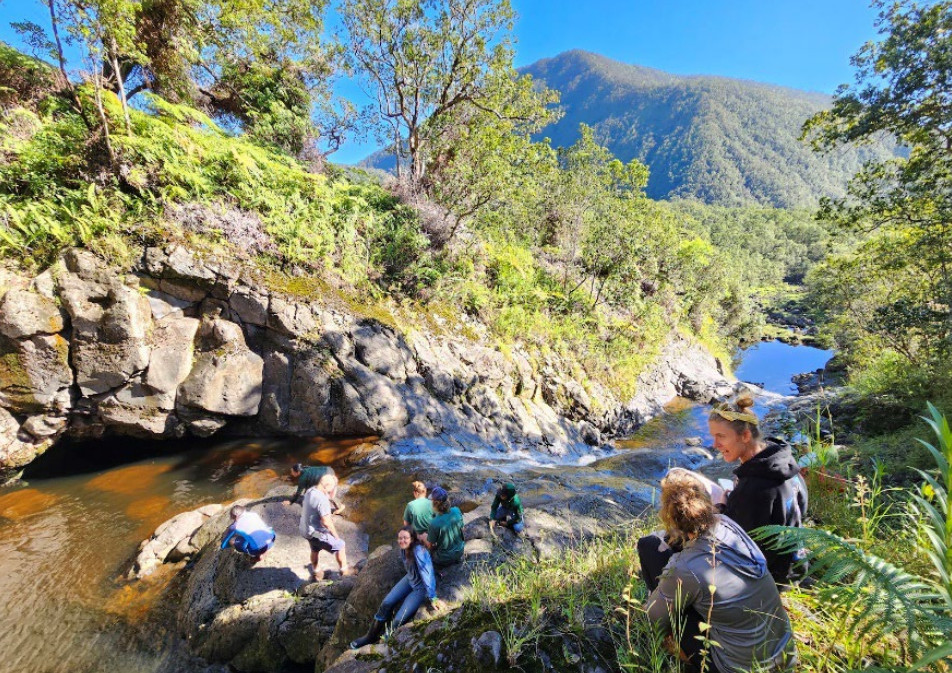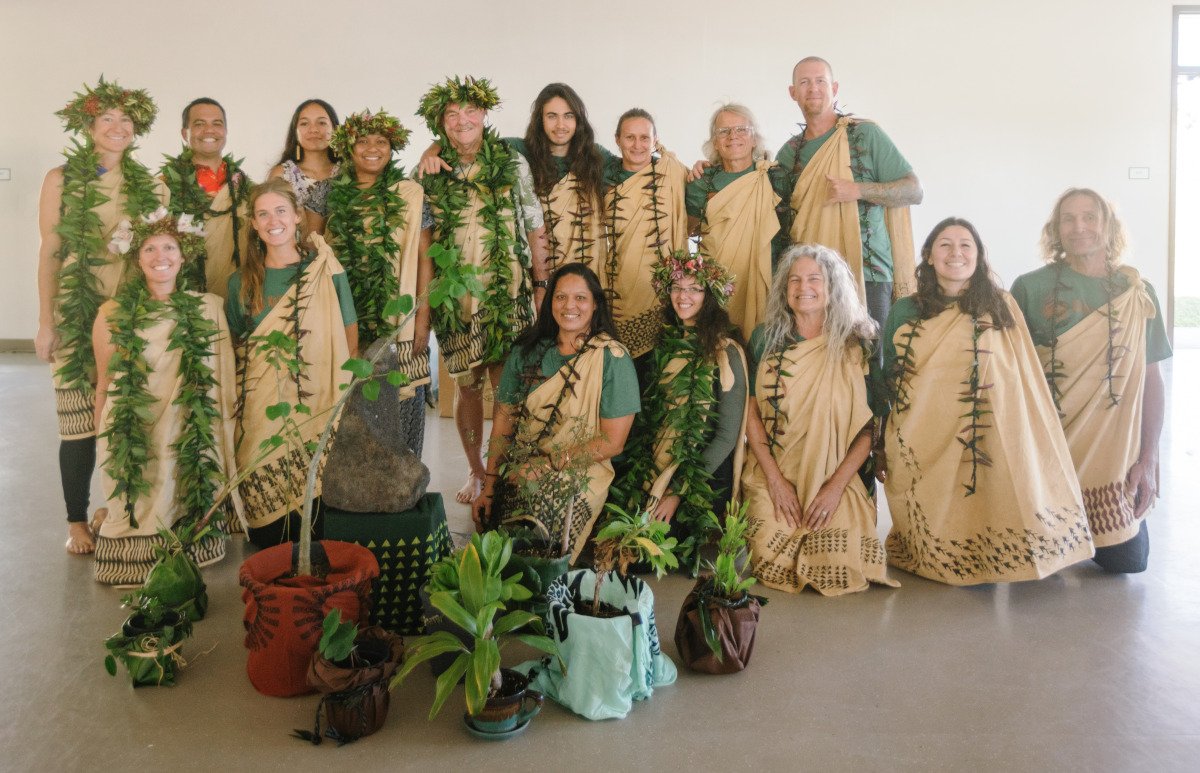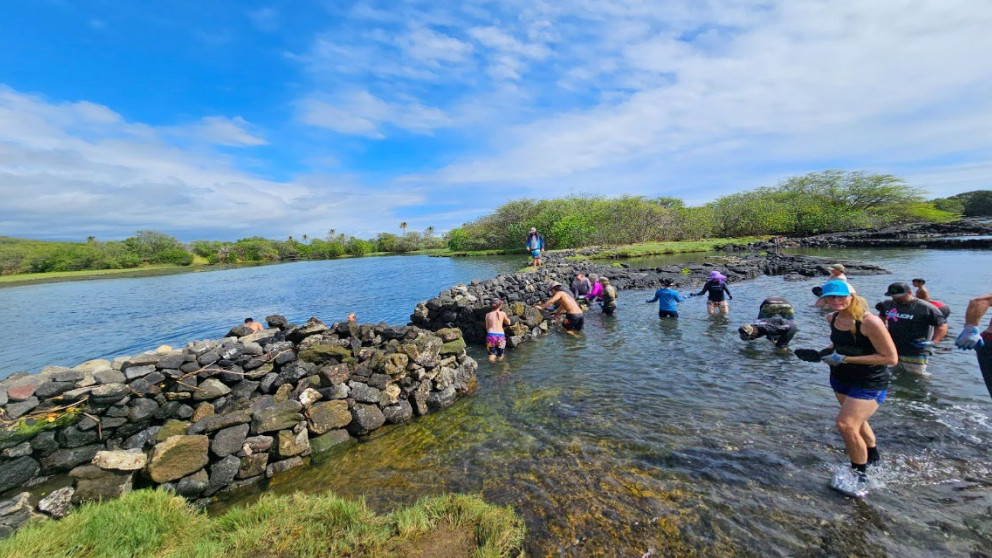
“Waiʻōhinu native Christine Alley carries her ʻaʻaliʻi to the kuahu, as it represents the resilience of the people of Kaʻū, at the recent stewardship training hō‘ike. It is the enactment of ʻōlelo noʻeau #507: He ʻaʻaliʻi ku makani mai au; ʻaʻohe makani nana e kulaʻi. I am a wind-resisting ʻaʻaliʻi; no gale can push me over. A boast meaning ‘I can hold my own even in the face of difficulties’.” (Photo courtesy Hawai‘i Tourism Authority)
(BIVN) – Ten Ka‘ū stewards recently completed an ‘āina-based education training program – “Ka‘ū Hoa Pili ‘Āina” – as part of the Hawai‘i Tourism Authority’s destination management efforts and Hawai‘i Island Community-Based Action Stewardship Program.
The program was facilitated by the non-profit Ka ‘Ohana O Honu‘apo, a resource stewardship organization based in Nā‘ālehu.
“The Ka‘ū community voiced the need to better manage tourism impacts on the natural resources in Punalu‘u through place-based curriculum,” said Mufi Hannemann in a Hawai‘i Tourism Authority news release. Hannemann is the HTA Board Chair and notably spent part of his career working in Pāhala and living in Nāʻālehu. “We thank Ka ‘Ohana O Honu‘apo for facilitating this community effort and the work of these local stewards to ensure the protection and preservation of this special place,” Hannemann said.

“Trainees discuss the importance of forest health on fresh water resources along the coastline at the TNC Preserve.” (Photo credit to Ka ʻOhana O Honuʻapo)
“It’s important to HTA that we continue to listen to our residents and support the collaborative initiatives they want to see within their communities,” said Daniel Nāho‘opi‘i, HTA’s interim president and CEO. “Mahalo to these stewards for committing themselves to the rigors of the training and the stewardship of their home moku (district), Ka ‘Ohana O Honu‘apo for their leadership and collaboration, and the many kumu and organizations for providing their mana‘o in this process.”
Ka ʻOhana O Honuʻapo also shared a lengthy news release, detailing the experience:
Ka ʻOhana O Honuʻapo (KOOH) is honored to have completed the Kaʻū Hoa Pili ʻĀina Training Program for 10 selected Kaʻū students after being rewarded the Destination Management Action Plan (DMAP) Hawai‘i Community-based Action Stewardship Program (HI-CASP) contract for Punalu‘u in September, 2023. KOOH would like to first and foremost recognize and mahalo the Hawaiʻi Tourism Authority (HTA), Hawai‘i Visitor and Convention Bureau (HVCB), and Rachel Kaiama, DMAP Manager for the Island of Hawai‘i Visitor Bureau (IHVB) for this opportunity.
KOOH has an all-volunteer board of five active community members and one part-time Loko Iʻa Coordinator. Ka ʻOhana team members come from diverse backgrounds and each individual carries an underlying tone of protecting the ecologically and culturally sensitive resources in Kaʻū. Our mission is to restore, care for and protect the natural and cultural resources within the Honuʻapo area. Utilizing the values of mālama ʻāina (care for the land), kūpono (honest and integrity), and kuleana (duty and responsibility), we work in community partnerships to preserve this area for future generations. In short, we are a small, grassroots team of hard-working volunteers dedicated to protecting the natural and cultural resources at Honuʻapo Bay and the adjacent coastline.

“Trainees and Ka ‘Ohana o Honu‘apo (KOOH) members at the recent Ka‘ū Hoa Pili ‘Āina stewardship training program hō‘ike were from front left: KOOH board member Jodie Rosam, Alice Birnbaum, Chelsae-Lynn Kobzi, assistant coordinator Alexic Kerver, Christine Inserra, Crystal Leonards and Neil Nevis. Back row: KOOH board members Megan Lamson and Daniel Dierking, Leiahi Kaʻawa, KOOH board member Nohea Kaʻawa, Mālama ʻĀina coordinator John Replogle, Alden Wells, Christine Alley, Jimmy Cocallas and Colby Lund.” (Photo courtesy Hawai‘i Tourism Authority)
The Kaʻū Hoa Pili ʻĀina Training Program was a project that focused on local training stewards in the practices of mālama ʻāina with a backbone of cultural practices and protocols, conservation and biological sciences, and communication skills relevant to the Kaʻū Moku. To oversee and organize the training experience of the 10 Kaʻū-resident stewards, we hired two seasonal staff members: a Mālama ʻĀina Coordinator, John Replogle, and an Assistant Coordinator, Alexis Kerver. Under the guidance and leadership of the two part-time Coordinators, and with support from other local nonprofit groups including Hawaiʻi Wildlife Fund, The Nature Conservancy’s Hawaiʻi Program, Nā Mamo o Kāwā, and Mālama Pono Punaluʻu and many other individuals and agencies, KOOH successfully hosted this program from late October 2023 through mid February 2024. This program was an incredible opportunity to empower our aspiring local community members, perpetuate Hawaiian lifeways, strengthen nonprofit connections, and maintain an ecologically resilient coastline, all in light of increased tourism in the region.
We worked collaboratively and inclusively with other local nonprofit entities as well as State, County, and Federal government agencies, and pertinent landowners to offer stewards a comprehensive training and stewardship experience from the shoreline into the forest. In total, we hosted 20 guest kumu (plus assistants) across 13 different organizations/entities, coordinated 11 huakaʻi (field excursions), and learned 20 different primary subjects related to natural and cultural resource conservation.
Classroom and huakaʻi topics included safety (CPR and first aid training), marine debris and coastal habitat restoration, effective communication and skill-building, moʻolelo and introductions to place (at all huakaʻi site), Community-Based Subsistence Fishing Area designation and community-based management, loko iʻa (fishpond) restoration and kuapā (fishpond wall) building, watershed and forest protection, kīhei dying and ʻohe kapala (bamboo printing), rare plant protection efforts, Kaʻū plantation days, history and impacts of current (and historic) land uses, native plant outplanting and restoration, cultural resources management and protocols, Hawaiian moon phase training (Kaulana Mahina), anchialine pools and Hawaiian coastal ecosystems, coral reef ecology and protection measures, limu and ʻopihi identification and gathering (plus moʻolelo and stewardship practices), plus oli, mele and storytelling experiences.
Because KOOH is mostly operated by unpaid community volunteers, we worked cohesively with Hawaiʻi Wildlife Fund, another local nonprofit organization. HWF staff took on the HR management for the paid Coordinator position, supported administrative tasks, and helped with initial funding to launch before the first check arrived.
Once selected, ten Kaʻū residents ranging in age from 18 into their sixties, began meeting on a weekly basis in late October 2023 for classroom lessons based out of Kamehameha School’s Kahuku Ranch, and huakaʻi and service-learning opportunities throughout Kaʻū and into Miloliʻi and Volcano. Over the course of this four-month program, Kaʻū Hoa Pili ʻĀina “Trainees” logged over 3,000 participation hours and an additional 313 hours of volunteer service to local nonprofit organizations. KOOH Board members and community volunteers logged an additional 480 hours to support this collective effort, giving the cumulative impact of this program as over 3,793 hours towards the betterment of Kaʻū.
“When volunteering, you gain so much, getting to connect with community members for a common goal. You definitely walk away with more than you came in with physically, mentally, and spiritually.” – Colby Lund, Steward.
In addition to classroom days, huakaʻi, reflections, research, oli (chants), moʻolelo (stories), moʻomeheu (culture), and hoʻoulu (hope for the future), Trainees also participated in putting together and hosting their final hōʻike on February 10, 2024 at the Kaʻū Multipurpose Room in Pāhala. This hōʻike served as a graduation ceremony from the Kaʻū Hoa Pili ʻĀina Training Program and a chance for the Trainees to showcase the impact that this program had on their lives in front of their friends, family, and community members. There were over 75 attendees, and many heartfelt sentiments (and tears) were shared. KOOH is extremely proud of these haumāna for embracing the program wholeheartedly and is so grateful to be given this opportunity for our collective Kaʻū community from HTA and HVCB.
“Participating in the Hōʻike was a profoundly impactful experience. I approached the event with a blend of confidence and apprehension, eager to share the remarkable insights and experiences we had gained. As I stood before the audience, I was overwhelmed by a surge of emotions as I reflected on the journey undertaken with my esteemed colleagues. The depth of the connections forged, and the richness of the experiences shared left an indelible mark on my development and my soul.” – Crystal Leonards, Steward.
Ka ʻOhana O Honuʻapo truly believes that in order to perpetuate successful stewardship of the landscape, focusing on bridging cultural knowledge and protocols with scientific knowledge and excellent communication skills, we must shift our focus and energies to intensive and high-quality training that is sustainable for the future preservation of the greater Kaʻū coastline and watersheds. Punaluʻu was indeed included and highlighted in this endeavor, but this stewardship training program went beyond the confines of any tax map key number, and benefited many wahi pana (special places) within Kaʻū.
“The Kaʻū Hoa Pili ʻĀina Stewardship Program has benefited my life tremendously. It has fed a yearning in my soul and directed me to a purposeful life. The program encouraged me to come out of my shell. Brought me purpose, confidence, and a whole new perspective. I have a deeper compassion and understanding for all living things. And an awareness to all ecosystems. The program has provided knowledge that could one day be lost and I feel so lucky to have been part of the first experience. I’ve made new friends along the way from my peers to teachers. The best part was working with other organizations and seeing what’s available out there. There is so much to do. As a community we can do great things. I hope the program can be around for future generations. I would love for my children to experience the same magic I did. Mahalo nui loa for granting us this opportunity.” – Chelsae Kobzi, Steward.
Again, this work would not have been possible without the support Ka ʻOhana O Honuʻapo received from the Hawaiʻi Tourism Authority (HTA), Hawaiʻi Visitor and Convention Bureau (HVCB), and Island of Hawaiʻi Visitor Bureau (IHVB). We are proud to share that more than 82% of the grant award remained in Kaʻū and additional in-kind (volunteer) and match donations were accrued by KOOH to help ensure the success of the program. We hope this is just the beginning for the Kaʻū Hoa Pili ʻĀina Training Program, and look forward to seeing what the future brings.
“I think each one of us expresses our deepest gratitude for this program and the rich experiences we have shared. We all honor the ʻāina a little more and are grateful for the sea, the forests, the water and wind that bring us life. Mahalo, mahalo nui loa, for this journey that has enriched our lives with the true spirit of Hawaiʻi. E ola mau ka ʻāina, may the land live on, and may the love we’ve cultivated here resonate across the islands.” – Jimmy Cocallas, Steward


by Big Island Video News3:37 pm
on at
STORY SUMMARY
KAʻŪ, Hawaiʻi - The non-profit Ka ‘Ohana o Honu‘apo facilitated the Ka‘ū Hoa Pili ‘Āina program, funded by the Hawai‘i Tourism Authority.